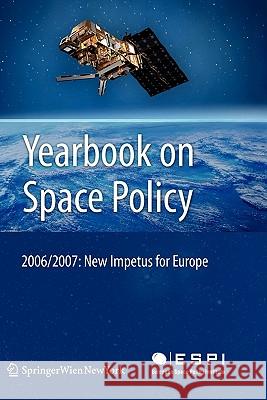Yearbook on Space Policy 2006/2007: New Impetus for Europe » książka
Yearbook on Space Policy 2006/2007: New Impetus for Europe
ISBN-13: 9783211999325 / Angielski / Miękka / 2010 / 330 str.
Spacepolicyisanissueareaofparticularstrategicrelevance. Itreceivesaconstantly growingattentionbynationalgovernmentsandtheEuropeanUnion. Ittouches numerousimportantareaslikesecurity, science, technology, knowledge, infor- tion, mobility, environmentorresourcemanagement, tonameonlyafew. Through this, spacepolicydrawsfrombutalsodrivesthemostdecisiveaspectsofmodern society. Anillustrationforthisstatementcanbegivenwithabrieflookonrecent developmentsinspacepolicy. InparticulartheadoptionoftheEuropeanSpace PolicyinMay2007, whichhadbeenjointlypreparedbytheEuropeanSpaceAgency andtheEuropeanCommission, doeshaveatremendousimpactonareasbene?ting fromspaceapplications, likeclimateresearch, disastermanagementorresource management. TheEuropeanSpacePolicywillalsopushareaslikenavigationor telecommunications, whichareattheheartoftheknowledgesocietyandtheme- issueofmobility. Atthesametime, securityinallitsfacetsisgrowinglydependingon theuseofspacecapabilitiesandspacepolicymakinghasstartedtore?ectthis. Onthe globallevel, theinitiativesforroboticandhumanspaceexplorationgainmoreand moreprominenceandwithactorslikeChina, arenaissanceofspaceasastrategictool forinternationalprestigeandin?uencecanbeobserved. Thecharacterofspacepolicyandthedynamisminthis?eldanditsrelatedareas makeitappropriateandevennecessarytosurveythis?eldonacontinuousbasiswith ahighstandard. ThisreasoningwasthebasisfortheinitiativebytheEuropeanSpace PolicyInstitute(ESPI)topreparetheYearbookonSpacePolicy. TheYearbookis intended to become the reference publication for the analysis of space policy developments. ThescopeisglobalbuttheperspectiveisEuropean. Thiscoincides withESPI?smissiontobethefocalpointforEuropeanresearchinthe?eldofspace policyasprovidedforbythedecisionoftheCounciloftheEuropeanSpaceAgency tofoundESPI. Asathinktank, ESPIhastoprovideinformationandanalysisandto contributefacilitating the decision-making process. The Yearbook isaimed to becomea?agshipinESPI?sproductlineapproachingthisgoal. Theaspirationis thattheYearbookonSpacePolicymaygainthestatureofcomparableyearbooksin internationalrelationsbyleadingthinktanksaroundtheworld. TheYearbookonSpacePolicyhasanumberofspeci?cfeatures. Thereporting periodwillusuallybefromJulytoJune, leadingtoitspublicationinthebeginningof thefollowingyear. Forthis?rstedition, thereportingperiodwassettostartearlier (from1January2006)butstopatthetypicaldate(30June2007). Thisservesthe purposetocoverthewholeyear2006. TheYearbookwillhavethreeparts. The?rst partispreparedbyESPIandprovidesasystematicanalysisofthemainspace v Preface activitiesintheglobalpoliticalcontext. Itcontainsapresentationofthemajor developmentsinspacepolicies, programmesandtechnologiesaroundtheworld. In thesecondpart, usuallyaroundtenprominentresearcherscontributearticlesto speci?ctopicsofparticularrelevance. Inthiseditiontheyarerelatedtoinitiativesand decisionsinEuropeanspacepolicies -asindicatedinthisyear?smottoofthe Yearbook-butalsoglobalissuesliketherecentChineseantisatellitetestorthenew Japanesespaceregulation. ThethirdpartoftheYearbook, againpreparedbyESPI, contains a unique compilation of important facts and ?gures. It includes achronology, anoverviewonspaceactivitiesinselectedcountriesandabibliography. TheprojectofacomprehensiveYearbookrequiresthecooperationofthewhole community. ThisiswhyESPI?sworkforthispublicationiscomplementedbythe contributionsofexternalauthorsprovidingtheirexceptionalinsightsandexperiences. ThesecontributorsfromalloverEuropearetheleadingacademicexpertsmainlybased inthinktanksanduniversityinstituteswhilesomearealsoassociatedwithspace ag











